 Petzlover
PetzloverNeapolitan Mastiff is originated from Italy but Tasy is originated from Kyrgyzstan. Both Neapolitan Mastiff and Tasy are having almost same height. Neapolitan Mastiff may weigh 44 kg / 98 pounds more than Tasy. Neapolitan Mastiff may live 3 years less than Tasy. Both Neapolitan Mastiff and Tasy has almost same litter size. Neapolitan Mastiff requires Moderate Maintenance. But Tasy requires Low Maintenance
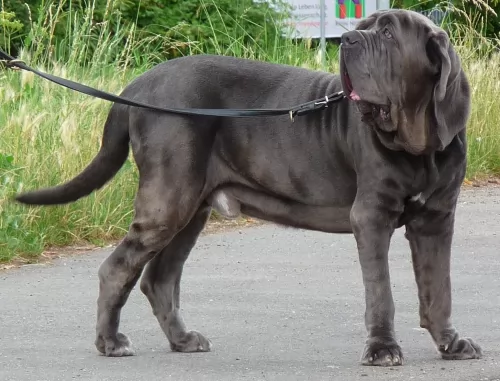 An ancient breed, the Neapolitan Mastiffs are massive dogs with a history of protecting their family and their property. The breed has deep rooted protective instincts and they are very frightening in appearance. The Neapolitan is of the Molosser group of dogs, all of whom probably came from the same line. It is known that all the mastiffs in Europe are descendants of the Tibetan Mastiff. The Tibetan Mastiff is considered the most ancient of all canines.
An ancient breed, the Neapolitan Mastiffs are massive dogs with a history of protecting their family and their property. The breed has deep rooted protective instincts and they are very frightening in appearance. The Neapolitan is of the Molosser group of dogs, all of whom probably came from the same line. It is known that all the mastiffs in Europe are descendants of the Tibetan Mastiff. The Tibetan Mastiff is considered the most ancient of all canines.
The Asian Mastiffs came from India to Greece around 300 BC with Alexander the Great. Then the breed was brought to the Romans by the Greeks and then introduced them in their circus in fights. Another possibility is that around 500 BC the mastiffs came to Britain from the Phoenicians. Either way the Roman Molossus is the ancestor of the Neapolitan Mastiff.
The Romans crossed the breed with the English Mastiff around 55 BC and developed a premiere war dog that was called a Mastini.
The breed eventually became extinct in Europe with the exception of Campania. The breed was recognized in 1946 with the standard accepted in 1949. However, it is believed that the Neapolitan Mastiff has been continuously present in Campania for over two thousand years. The breed was initially developed as war dogs and for the Roman coliseum spectacles.
In 1946 Dr. Piero Scanziani established a program to breed them in Italy. He wrote the breed standard in 1949.
Today the Neo is a farm dog, an army dog, a police dog and a guard dog. They were shown in Italy for the first time in 1946 but only in 2004 was the breed recognized by the American Kennel Club (AKC). It was 1973 when the Neapolitan Mastiff Club of America was born and 1996 when the standard was approved by the AKC. They are still a rare breed in the United States.
Call them Tasy or Tazys these sighthound dogs from Kazakhstan have always been used for hunting. This Turkish dog is thought to be one of the oldest dog breeds in the world.
There aren’t many left in the world and the Kazakhstan government is putting steps into action to prevent the dog from becoming extinct.
These dogs are not recognized by the Federation Cynologique Internationale. Their ancestry is unclear, but the dog shares DNA with quite a few similar-looking breeds.
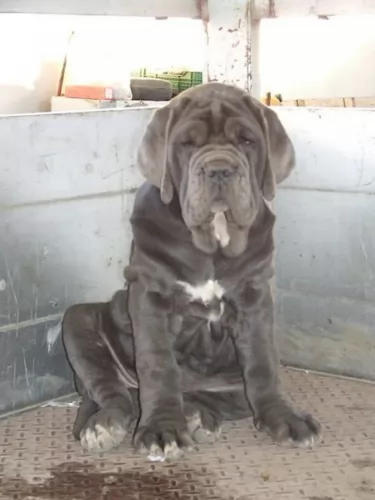 The Neapolitan Mastiff is a massive dog , so powerful and very intimidating in his looks. With an incredibly large head and hanging folds and wrinkles, the Neo is an impressive animal. His inner nobility and dignity is evident in his stance and the way he holds himself. He is relaxed, calm, quiet yet imposing none the less. His coat is dark whether black, tawny, gray or mahogany. He is muscular beyond imagination. The Neo is 10-15% longer than he is tall.
The Neapolitan Mastiff is a massive dog , so powerful and very intimidating in his looks. With an incredibly large head and hanging folds and wrinkles, the Neo is an impressive animal. His inner nobility and dignity is evident in his stance and the way he holds himself. He is relaxed, calm, quiet yet imposing none the less. His coat is dark whether black, tawny, gray or mahogany. He is muscular beyond imagination. The Neo is 10-15% longer than he is tall.
On his massive head his eyes are deep set and covered by his eye lids that droop. His eyes are blue as puppies then dark and coordinated with his coat. and his nose is large and the color of his coat. Ears are natural or can be cropped, and they carry their tail straight and curving back. The Neo has round paws and arched toes.
The slender Tasy is a fairly large dog standing at between 55 to 72 centimeters in height and weighing in the region of 20 – 35g.
The dog has a short, silky coat and can be in a number of colors – fawn, grey, red.The tail is long and thin, the legs long and slender, the muzzle long and thin and the floppy ears are often folded back.
Independent and Intelligent, the Tasy will be easy to train. This is a gentle dog, not looking to get into trouble with other dogs. He gets on well with children and loves human companionship. They are known for their playfulness.
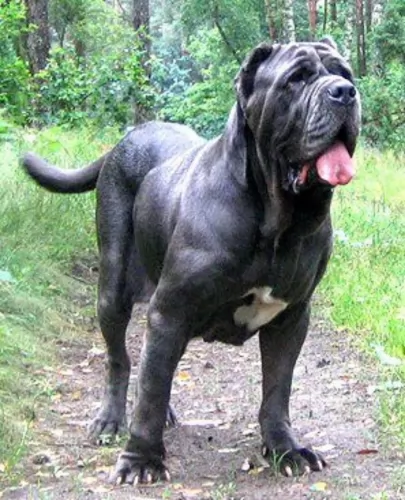 Older children in their family. No toddlers or strangers.
Older children in their family. No toddlers or strangers.
Protective yet quiet, calm, relaxed
No they won’t adapt well to apartment living or to strangers.
They are intelligent and trainable but must be socialized and know the human is the alpha or they will take over.
The Tasy is such a beautiful dog and capable of making a splendid family pet and companion.
It is sad that these dog's numbers have dropped so much so that there is concern for its existence.
We hope that the Tasy's breeding programs meet with success and that this slender, attractive dog, such an ancient breed, will take his place firmly as man’s best friend.
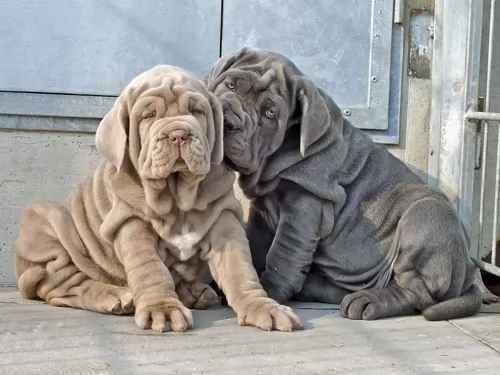 The Neapolitan Mastiff is prone to many of the same issues as any massive, extra large breed. The most common of these is Cherry Eye.
The Neapolitan Mastiff is prone to many of the same issues as any massive, extra large breed. The most common of these is Cherry Eye.
Your Tasy is such a beautiful dog, you don’t want to see him getting sick, and yet there are some illnesses and conditions he can succumb to -
Many large breeds, even slender ones, can be prone to hip dysplasia. This is where the joint’s ball and socket don't fit together properly. For your canine friend it can mean pain and arthritis, and you may find your pet making a huge effort to stand once he is lying down.
Any dog can become overweight, but it is more noticeable in slender-build dogs like the Tasy. Obesity pus unnatural pressure on the joints and it is also linked to other health problems. Every dog needs good food and good exercise.
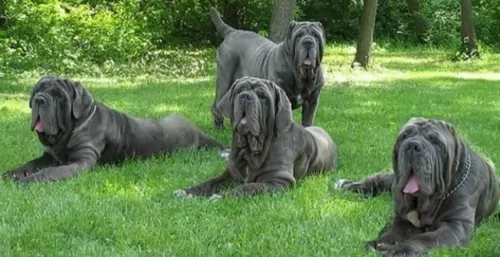 Neapolitans grow fast and so don’t overfeed when they are young. Lower protein and higher fat content.
Neapolitans grow fast and so don’t overfeed when they are young. Lower protein and higher fat content.
Don’t overfeed the adult as they can become obese.
This big hearty breed needs exercise but not too much. They overheat easily. The puppy will push himself, so you have to make sure he doesn’t over do it. No tug of war games. They need a long walk twice every day.
The Tasy is a playful, energetic dog and will need to be exercised on a regular basis. He loves a good run and is the kind of dog that won’t do well in a small city property. He is far better suited to life in the country where he can run freely.
The Tazy is looked upon as being low maintenance. It’s always a good idea to get into the habit of brushing your dog’s coat once or twice a week to not only remove loose hairs but to have some bonding time with your pet.
It’s also time to run your hands over the lean body ad to make sure there aren’t any unusual lumps. Look inside his ears and make sure there is no sign of redness to indicate an infection. Remember, if you don’t like to do the grooming part for your pet, professional groomers can do all these things for you as well as trim his nails and clean his teeth.
The Tasy is a fairly tall, lean, energetic dog, so if you opt to feed him one of the commercially manufactred dog foods there are, choose one that suits the age, size and energy levels of your pet.
Your dog can get sick if you feed him inferior dog food so read the packaging carefully and make sure its a good brand with vitamins and minerals instead of useless, toxic fillers.
Try to include some simple,home-made food devoid of spices or other exotic things that can give him a stomach ache. Boiled chicken, brown rice or pasta and spinach, sweet potatoes and carrots are a super healthy choice. Chop it up and feed it to your pet twice a week or so as a tasty treat.